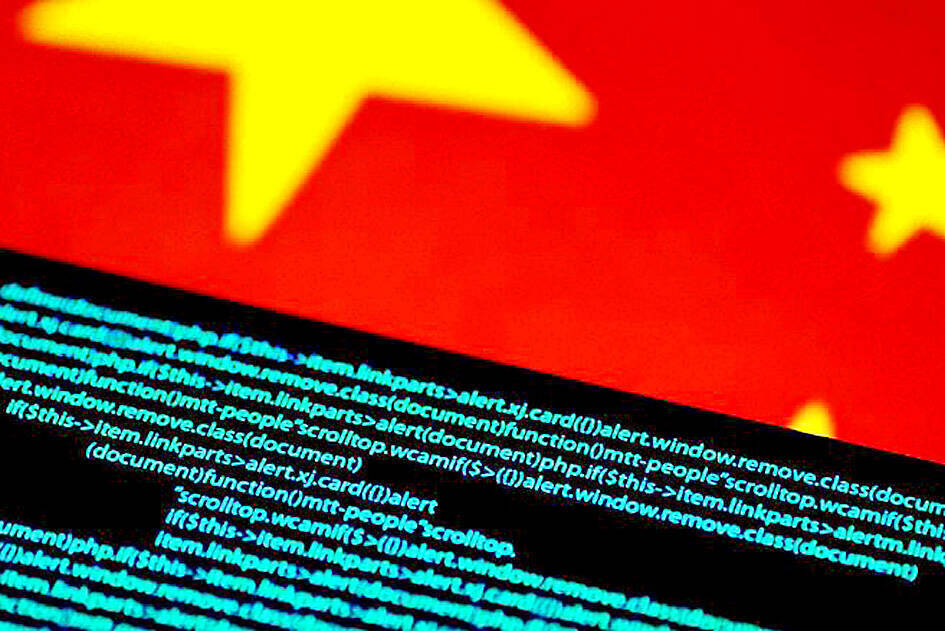A suspected Chinese state-sponsored hacking group has stepped up its targeting of Taiwanese organizations, particularly those in government, education, technology and diplomacy sectors, a report by cybersecurity intelligence company Recorded Future said.
The cyberattacks by the group known as RedJuliett were observed between November last year and April, during the lead-up to the presidential and legislative elections in January and the subsequent change in administration.
RedJuliett has targeted Taiwanese organizations in the past, but this is the first time that activity was seen at such a scale, a Recorded Future analyst said, speaking on condition of anonymity out of safety concerns.

Photo: Reuters
The report said that RedJuliett attacked 24 organizations, including government agencies in places like Laos, Kenya and Rwanda, as well as Taiwan.
It also hacked into Web sites of religious organizations in Hong Kong and South Korea, a US university and a Djiboutian university. The report did not identify the organizations.
Recorded Future said RedJuliett accessed the servers of those places through a vulnerability in their SoftEther enterprise virtual private network (VPN) software, an open-source VPN that allows remote connections to an organization’s networks.
RedJuliett has been observed attempting to break into systems of more than 70 Taiwanese organizations including three universities, an optoelectronics company and a facial recognition company that has contracts with the government.
It was unclear if RedJuliett managed to break into those organizations: Recorded Future only said it observed the attempts to identify vulnerabilities in their networks.
RedJuliett’s hacking patterns match those of Chinese state-sponsored groups, Recorded Future said.
Based on the geolocations of Internet protocol addresses, RedJuliett is likely based out of Fuzhou, in China’s Fujian Province, the coast of which faces Taiwan, it said.
“Given the close geographical proximity between Fuzhou and Taiwan, Chinese intelligence services operating in Fuzhou are likely tasked with intelligence collection against Taiwanese targets,” the Recorded Future report said.
“RedJuliett is likely targeting Taiwan to collect intelligence and support Beijing’s policymaking on cross-strait relations,” it said.
The Ministry of Foreign Affairs and the Chinese Ministry of Foreign Affairs did not immediately comment.
Microsoft in August last year reported that RedJuliett, which the US company tracks under the name Flax Typhoon, was targeting Taiwanese organizations.
China has in the past few years stepped up military drills around Taiwan and imposed economic and diplomatic pressure on the nation.
Relations between Taipei and Beijing worsened after the election of William Lai (賴清德), who China has deemed a “separatist,” after he said in his inauguration speech that Taiwan and China were not subordinate to each other.
Like his predecessor Tsai Ing-wen (蔡英文), Lai has said that there is no need to declare Taiwanese independence because it is already an independent sovereign state.
Like many other countries including the US, China has been known to engage in cyberespionage. Earlier this year, the US and the UK accused China of a sweeping cyberespionage campaign that allegedly affected millions of people.
Beijing has consistently denied engaging in any form of state-sponsored hacking, instead saying that China itself is a major target of cyberattacks.
According to Recorded Future, Chinese state-sponsored groups will likely continue to target Taiwanese government agencies, universities and critical technology companies via “public-facing” devices such as open-source VPN software, which provide limited visibility and logging capabilities.
Companies and organizations can best protect themselves by prioritizing and patching vulnerabilities once they become known, Recorded Future’s threat intelligence analyst said.

An essay competition jointly organized by a local writing society and a publisher affiliated with the Chinese Communist Party (CCP) might have contravened the Act Governing Relations Between the People of the Taiwan Area and the Mainland Area (臺灣地區與大陸地區人民關係條例), the Mainland Affairs Council (MAC) said on Thursday. “In this case, the partner organization is clearly an agency under the CCP’s Fujian Provincial Committee,” MAC Deputy Minister and spokesperson Liang Wen-chieh (梁文傑) said at a news briefing in Taipei. “It also involves bringing Taiwanese students to China with all-expenses-paid arrangements to attend award ceremonies and camps,” Liang said. Those two “characteristics” are typically sufficient

A magnitude 5.9 earthquake that struck about 33km off the coast of Hualien City was the "main shock" in a series of quakes in the area, with aftershocks expected over the next three days, the Central Weather Administration (CWA) said yesterday. Prior to the magnitude 5.9 quake shaking most of Taiwan at 6:53pm yesterday, six other earthquakes stronger than a magnitude of 4, starting with a magnitude 5.5 quake at 6:09pm, occurred in the area. CWA Seismological Center Director Wu Chien-fu (吳健富) confirmed that the quakes were all part of the same series and that the magnitude 5.5 temblor was

The brilliant blue waters, thick foliage and bucolic atmosphere on this seemingly idyllic archipelago deep in the Pacific Ocean belie the key role it now plays in a titanic geopolitical struggle. Palau is again on the front line as China, and the US and its allies prepare their forces in an intensifying contest for control over the Asia-Pacific region. The democratic nation of just 17,000 people hosts US-controlled airstrips and soon-to-be-completed radar installations that the US military describes as “critical” to monitoring vast swathes of water and airspace. It is also a key piece of the second island chain, a string of

The Central Weather Administration has issued a heat alert for southeastern Taiwan, warning of temperatures as high as 36°C today, while alerting some coastal areas of strong winds later in the day. Kaohsiung’s Neimen District (內門) and Pingtung County’s Neipu Township (內埔) are under an orange heat alert, which warns of temperatures as high as 36°C for three consecutive days, the CWA said, citing southwest winds. The heat would also extend to Tainan’s Nansi (楠西) and Yujing (玉井) districts, as well as Pingtung’s Gaoshu (高樹), Yanpu (鹽埔) and Majia (瑪家) townships, it said, forecasting highs of up to 36°C in those areas